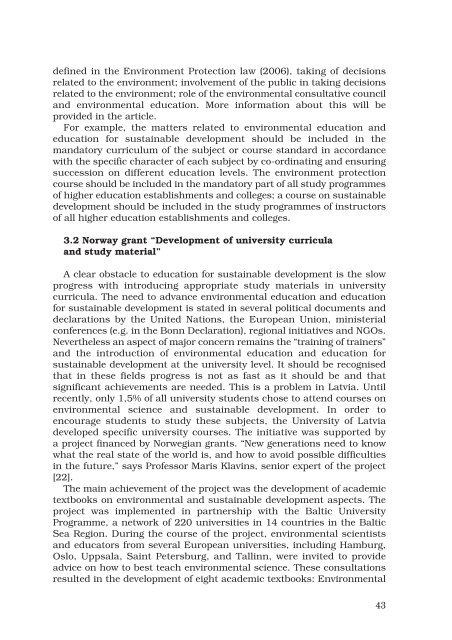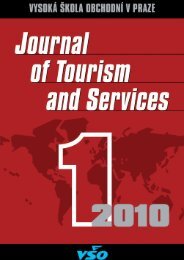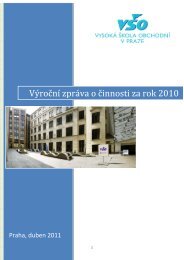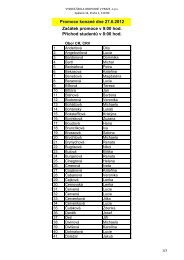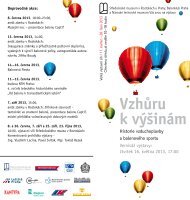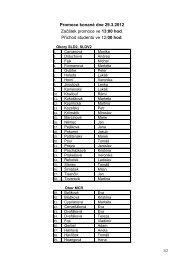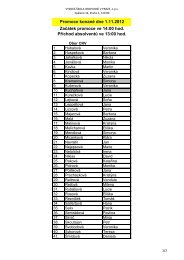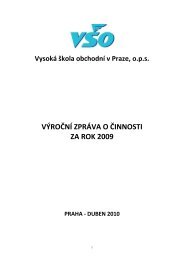Journal of Tourism and Services - Vysoká škola obchodnà v Praze
Journal of Tourism and Services - Vysoká škola obchodnà v Praze
Journal of Tourism and Services - Vysoká škola obchodnà v Praze
You also want an ePaper? Increase the reach of your titles
YUMPU automatically turns print PDFs into web optimized ePapers that Google loves.
defined in the Environment Protection law (2006), taking <strong>of</strong> decisions<br />
related to the environment; involvement <strong>of</strong> the public in taking decisions<br />
related to the environment; role <strong>of</strong> the environmental consultative council<br />
<strong>and</strong> environmental education. More information about this will be<br />
provided in the article.<br />
For example, the matters related to environmental education <strong>and</strong><br />
education for sustainable development should be included in the<br />
m<strong>and</strong>atory curriculum <strong>of</strong> the subject or course st<strong>and</strong>ard in accordance<br />
with the specific character <strong>of</strong> each subject by co-ordinating <strong>and</strong> ensuring<br />
succession on different education levels. The environment protection<br />
course should be included in the m<strong>and</strong>atory part <strong>of</strong> all study programmes<br />
<strong>of</strong> higher education establishments <strong>and</strong> colleges; a course on sustainable<br />
development should be included in the study programmes <strong>of</strong> instructors<br />
<strong>of</strong> all higher education establishments <strong>and</strong> colleges.<br />
3.2 Norway grant “Development <strong>of</strong> university curricula<br />
<strong>and</strong> study material”<br />
A clear obstacle to education for sustainable development is the slow<br />
progress with introducing appropriate study materials in university<br />
curricula. The need to advance environmental education <strong>and</strong> education<br />
for sustainable development is stated in several political documents <strong>and</strong><br />
declarations by the United Nations, the European Union, ministerial<br />
conferences (e.g. in the Bonn Declaration), regional initiatives <strong>and</strong> NGOs.<br />
Nevertheless an aspect <strong>of</strong> major concern remains the “training <strong>of</strong> trainers”<br />
<strong>and</strong> the introduction <strong>of</strong> environmental education <strong>and</strong> education for<br />
sustainable development at the university level. It should be recognised<br />
that in these fields progress is not as fast as it should be <strong>and</strong> that<br />
significant achievements are needed. This is a problem in Latvia. Until<br />
recently, only 1,5% <strong>of</strong> all university students chose to attend courses on<br />
environmental science <strong>and</strong> sustainable development. In order to<br />
encourage students to study these subjects, the University <strong>of</strong> Latvia<br />
developed specific university courses. The initiative was supported by<br />
a project financed by Norwegian grants. “New generations need to know<br />
what the real state <strong>of</strong> the world is, <strong>and</strong> how to avoid possible difficulties<br />
in the future,” says Pr<strong>of</strong>essor Maris Klavins, senior expert <strong>of</strong> the project<br />
[22].<br />
The main achievement <strong>of</strong> the project was the development <strong>of</strong> academic<br />
textbooks on environmental <strong>and</strong> sustainable development aspects. The<br />
project was implemented in partnership with the Baltic University<br />
Programme, a network <strong>of</strong> 220 universities in 14 countries in the Baltic<br />
Sea Region. During the course <strong>of</strong> the project, environmental scientists<br />
<strong>and</strong> educators from several European universities, including Hamburg,<br />
Oslo, Uppsala, Saint Petersburg, <strong>and</strong> Tallinn, were invited to provide<br />
advice on how to best teach environmental science. These consultations<br />
resulted in the development <strong>of</strong> eight academic textbooks: Environmental<br />
43


